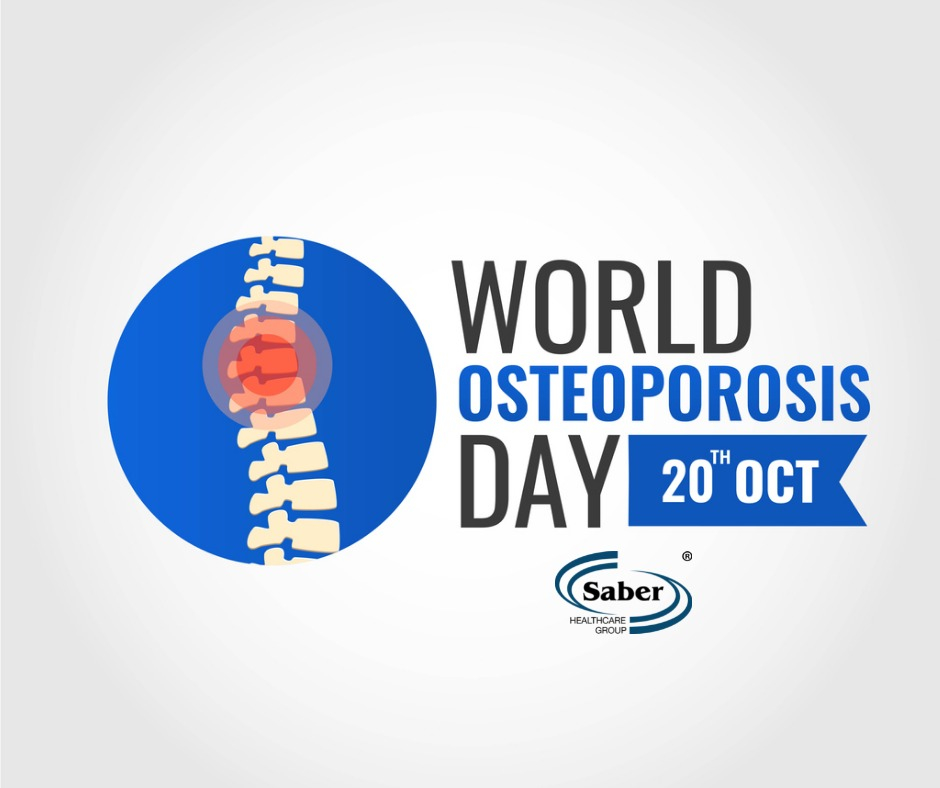Commitment + Clinical Leadership = Better Outcomes

Osteoporosis: Signs and Risk Factors
Osteoporosis is a disease that causes the bones to become weak, making them more prone to fractures and breaks.
The Cleveland Clinic estimates that osteoporosis is the cause of more than 2 million fractures each year.1 1 in 3 women and 1 in 5 men in the world over 50 years old will experience a fracture due to osteoporosis.2
World Osteoporosis Day is dedicated to spreading awareness on the risks and prevention of osteoporosis. Here are some facts on how osteoporosis occurs and how you can reduce your risk of developing it.
What is Osteoporosis?
Osteoporosis is a disease that can progress without any signs or symptoms, and simply means someone has less bone mass and strength.1 The term osteoporosis means “porous bone” because the bones become weak and more prone to breaking easily.3
Osteoporosis is the cause of many broken bones in older adults, especially the spine, hips, or wrists.3 When osteoporosis affects the spine, it can cause some individuals to experience a hunched back. As a result, osteoporosis can limit mobility when left untreated.
What Puts You at Risk for Osteoporosis?
There is not one specific explanation as to how osteoporosis occurs, but there are numerous factors that can put you at risk or increase your chance of developing it.
Risks Out of Your Control
As with many health conditions, there are some risk factors that may be out of your control due to genetics.
According to the Mayo Clinic, here are some of those unchangeable factors that can put you at risk for osteoporosis4:
- Gender. Women are more likely to develop osteoporosis than men.
- Age. Your risk for osteoporosis increases with age.
- Family. If a close relative such as a parent or sibling had osteoporosis, you have an increased risk.
- Size. If you naturally have a smaller body frame, you may be more at risk because you have less bone mass.
Other Risk Factors
Here are some other risk factors that you might be able to control.5
- Medications. It’s important to note that some medications may cause bone loss, which can lead to osteoporosis. Talk to your doctor about your medications and the side effects if you think you might be at risk for developing osteoporosis.
- Low calcium. If you do not consume enough calcium throughout your lifetime, this can lead to osteoporosis due to diminished bone density.
- Diet or eating disorders. Restricting food or extreme dieting can lead to weakened bones.4
- Alcohol or tobacco use. Tobacco has been shown to weaken bones. Excessive alcohol consumption can also increase your risk of osteoporosis.
- Low activity. Individuals with a sedentary lifestyle, or those who spend a lot of time sitting, have an increased risk of osteoporosis.
Health Conditions
There are certain health conditions that may increase an individual’s risk of developing osteoporosis.3 Some of these include:
- Autoimmune disorders such as Lupus and Rheumatoid arthritis
- Digestive disorders such as Celiac and Inflammatory Bowel Disease (IBS)
- Neurological disorders such as Parkinson’s disease and Multiple Sclerosis (MS)
- Endocrine disorders such as diabetes and hyperthyroidism
How to Help Prevent Osteoporosis
From a young age, there are steps that can be taken to help decrease your risk of developing osteoporosis in your later years.
Here are some simple steps to help prevent osteoporosis6:
- Eat healthy meals that include whole grains, fruits, and vegetables
- Eat calcium-rich foods such as dairy products, beans, leafy greens, almonds, and whey protein7
- Consume vitamin D by spending time outside and eating foods with vitamin D such as salmon, eggs, and cheese
- Avoid smoking
- Avoid excessive alcohol consumption
- Limit caffeine
- Stay active with weight bearing exercises
Treatment for Osteoporosis
There is no one specific treatment for osteoporosis, nor one that can cure it, but your doctor can help you determine which option is best for you.
If you or your doctor suspects you have osteoporosis, they may order a bone density test.3 A bone density test uses X-rays to show how much calcium and minerals are present in a certain segment of the bone.8
Your doctor may discuss falls prevention with you, as well as safer exercises to remain active.9
There are also medications that some individuals with osteoporosis take to help protect their bones from fractures. These medications fall into two different categories10:
- Antiresorptive medications help to slow down the rate at which your body breaks down the bones.
- Anabolic medications help to increase bone formation within the body.
The most common medication taken to ease the symptoms of osteoporosis is Bisphosphonates. This medication slows bone loss and can be taken as a pill or administered through an IV.
If you’re interested in more treatment options for osteoporosis, talk with your doctor.
Learn More about Osteoporosis Today
Take the time to learn more about how osteoporosis occurs and the effects it has on the body. Once you’re aware of the risk factors, you can take the steps to help prevent it.
If you or a loved one experience any signs of osteoporosis or believe you are at risk, please talk with a doctor.
Saber Healthcare is an organization dedicated to providing consultant services to long term care providers. This article is for informational purposes and is not meant to be seen as professional advice. Please consult with a medical expert before relying on the information provided.
Sources
- https://my.clevelandclinic.org/health/diseases/4443-osteoporosis.
- https://www.worldosteoporosisday.org/about-osteoporosis.
- https://www.nof.org/patients/what-is-osteoporosis/.
- https://www.mayoclinic.org/diseases-conditions/osteoporosis/symptoms-causes/syc-20351968.
- https://www.bones.nih.gov/health-info/bone/osteoporosis/overview.
- https://www.betterhealth.vic.gov.au/health/conditionsandtreatments/osteoporosis.
- https://www.healthline.com/nutrition/15-calcium-rich-foods.
- https://www.mayoclinic.org/tests-procedures/bone-density-test/about/pac-20385273.
- https://www.saberhealth.com/news/blog/how-to-prevent-falls-in-seniors.
- https://www.webmd.com/osteoporosis/what-to-know-about-osteoporosis-meds.
